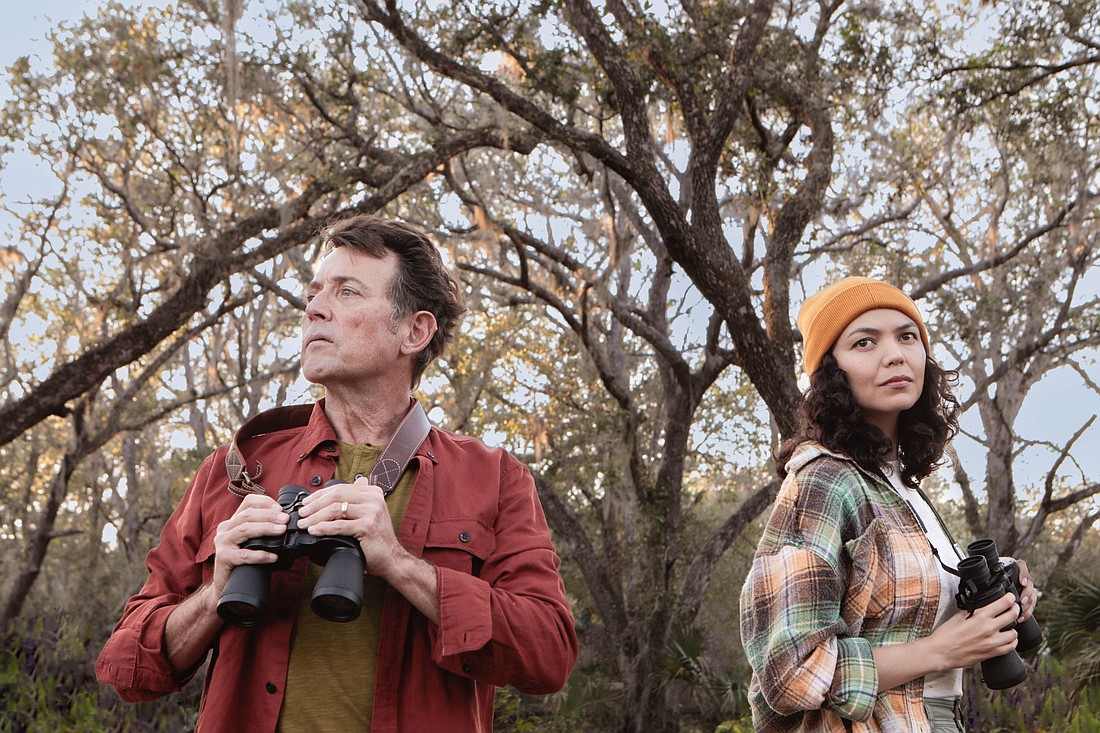- May 24, 2025
-
-
Loading

Loading

“Nothing lasts forever.” So the Kinks say, but it still is news.
Time is short, both on a personal and a planetary level. The clock is ticking — really. Anna Ouyang Moench’s “Birds of North America” brings this timely thought to mind at the Urbanite Theatre.
Caitlyn (Dekyi Rongé) visits her father John (Stephen Spencer) every fall. They chat about life, the universe, and everything in his backyard. They love each other — but they’re constantly squabbling. Bird watching keeps them together.
The play unfolds during these annual visits. There’s very little plot. It’s more like a ridiculously long, constantly interrupted, nine-year conversation. Year after year, the conversation turns into an argument. So what are they arguing about? Basically, the question every domineering parent has asked since the dawn of time …
What are you going to do with your life?
That argument about that question leads to all the others.
John is a baby boomer. He’s got a medical degree — as does his unseen wife. She has a thriving practice. He’s an independent medical researcher. For the last two decades, John’s been developing an experimental vaccine for Africa’s endemic mosquito-borne diseases. He has no grants. Nobody’s paying him. For John, that’s no problem. Thanks to his wealthy wife, it’s a one-income household. She brings home the bacon, and he doesn’t have to. John’s free to follow his dreams and devote his life to pure science.
Caitlyn is either a Gen-Xer or a millennial. She also dreams. In college, she’d started a novel. (In her words, “a sci-fi speculative fiction thing.”) Unlike her father, Caitlyn had no grants or subsidies. After graduation, she put the novel on hold — and found a good-paying job as a copy editor for a right-wing news outlet. She didn’t approve of their politics, but she did approve of their paycheck. This led to more gigs with the NRA and big oil companies. Her father disapproves. He’d quit! As a matter of moral principle! But he has that luxury.
Summer Wallace directs this intermittent character study like a voyeur with a time machine. And she brings the audience along for the ride. You get the sense that what you’re seeing has already happened. Will climate change be reversed? Is a father-and-child reunion in the cards? You already know the ending. She’s just showing you how we got there.
Alison Gensmer’s costumes evoke Caitlyn’s financial ups and downs and her father’s freedom to wear any damn thing he wants. Frank Chavez’s set doesn’t try to look like a realistic backyard. It’s abstract and disconnected — a slice of space/time, cut off from all else. Rick Cannon’s massive white-on-black bird paintings add to the detachment. They look like chalkboard drawings or illustrations in an ornithological textbook. In a weird contrast, the birdsong in Rew Tippin’s sound design is grounded in the real world. (Close your eyes, and it’s easy to imagine the physical environment.) Alex Pinchin’s lighting perfectly illuminates this tangent universe.
“Birds of North America” is a sharply written play. So sharp, it sometimes cuts.
Moench’s play hints that Caitlyn and John had some ugly break in the past. They’re not officially estranged anymore. They’re back together, but they don’t see eye-to-eye. (Thanks to their binocular empowered bird watching, that’s often literally true.)
Caitlyn and John’s bird watching is a distraction. It gives them something to talk about — and avoid talking about what really matters. The clock is ticking — and you want father and daughter to have an honest, heart-to-heart talk and truly reconnect.
Reconciliation is what’s at stake, but it doesn’t seem likely.
John offers to proofread Caitlyn’s unfinished novel. He does — and finds the key to his unfinished research in her speculative fiction. It works! Zika and Dengue fever are a thing of the past. John and Caitlyn go out to the ice cream parlor to celebrate.
Don’t hold your breath, folks.
“Birds of North America” isn’t just a father-daughter character study. It’s also a play about climate change. Oddly, it’s not a call to action.
John’s eco-sermonizing gets boring. He crusades against global warming. But his words feel like hot air. He’s wants Caitlyn to honor her principles by living in poverty. He denies his wife a trip to Italy because jet airplanes are bad for the planet. What a jerk!
You sympathize with the daughter and her unseen mother, not John. You probably won’t feel like reducing your carbon footprint when you get home.
And so it goes.
Year after year, the backyard gets warmer. Habitats vanish. Migration patterns change. More and more birds disappear. Will our species change its ways? Again, not bloody likely.
Humans are great with sudden danger. Forest fires, snipers and mountain lions make us leap into action. But we’re lousy at slow-motion threats like climate change. They tend to inspire talk and little else.
Rachel Carson’s “Silent Spring” imagined a future without birdsong. Moench’s play imagines a future without any song at all. It might be humanity’s most probable future.
Moench makes you sad about it. Unless her play is a clever form of reverse psychology, she doesn’t try to make you change it. Ah, well …
Nothing lasts forever.
When: Through Feb. 12
Where: Urbanite Theatre, 1487 Second St., Sarasota
Tickets: $25-$39
Info: Call 321-1397 or visit UrbaniteTheatre.com.